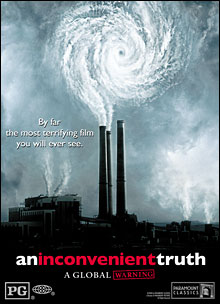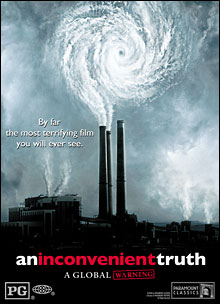It’s something of a miracle that An Inconvenient Truth, the chronicle of Al Gore’s quest to raise alarm about “climate chaos,” exists at all. A movie with a scantily clad Jessica Alba presenting a computer slideshow on climate science is implausible enough. Al Gore doing it, well … even C-SPAN could be forgiven for having second thoughts.

Albert Arnold Gore Jr. may be many things, but he’s no penguin. And this is no Murderballian story of triumph over tragedy. It’s a story of tragedy over tragedy. His sister’s death of lung cancer. The near-death of his 6-year-old son. The 2000 election. All of these crushing blows convinced Gore it was worth devoting himself to a fight that looks unlikely to have a happy ending. Worth his time to schlep his own luggage through an endless succession of airports, gamely presenting his climate slideshow to more than 1,000 small audiences in dingy conference rooms around the world.
This is a film composed of grim science interspersed with grim personal reminiscences.
Pass the popcorn!
That the film succeeds at all is a testament to Gore’s slideshow, which carefully, methodically covers the fundamentals of climate science, with some recent, shocking studies thrown in for good measure. There has perhaps never been so perfect a union of wonk and intractable problem. At each stop on his one-man climate road show, he gets feedback about what works and what doesn’t. He seeks roadblocks and obstacles to understanding, as he puts it, and attempts to remove them. He’s constantly tapping away on his Mac (Apple should be paying some product-placement dough): fiddling with the show, rearranging the order, adding new slides based on new information. It’s nerd porn.

Al Gore and director Davis Guggenheim.
“I told you, Davis, absolutely no nudity!”
Photo: © 2006 Paramount Classics.
If you believe a recent article in The American Prospect, Gore’s meta-plan since 2000 has been disintermediation: removing the information middleman. After bitter experience, he knows how the media filter can distort. He knows how press narratives can mold “conventional wisdom” unconnected to reality and immune to revision.
With his peripatetic slideshow, Gore is effecting the most brute-force, stubborn kind of disintermediation: he’s traveling room to room, city to city, country to country, reaching people in small batches. He’s speaking for himself, one crowd at a time.
A Teachable Foment
It’s hard to see how anyone could leave the presentation unconvinced that global warming is a problem. There will be points of controversy — you can expect, for instance, to hear kvetching over what is really melting the snows of Kilimanjaro, and whether climate change really caused Katrina — but there are so many separate data points, their sheer weight will crush all but the most adamantine denial.
Gore comes off well playing the professor. He was hobbled as a political candidate in an era that mistakes folksy soundbites for wisdom; he sucks at the folksy soundbite. But when he’s got 1.5 hours of your time, he loses the robotic bearing and relaxes. As a professor, he’s affable, self-effacing, and patiently, steadily persuasive.
The film’s big gamble is pushing its portrayal of Gore beyond wonk to prophet: a voice in the wilderness, driven by deeply felt personal experience to carry a righteous torch through 25 years of darkness. This involves much pensive staring out of windows. These scenes tend to be accompanied by breathy, reflective narrations from Gore, initially jarring but eventually almost seductive.
Of course this valorization will madden Gore’s many detractors. But even his supporters can be forgiven for wondering why there is an eight-year hole in the narrative. Reagan and both Bushes drift by; conspicuously absent is a single glimpse of a certain someone, name rhymes with hintin’. You may remember him from the years 1993 to 2000, when he ran the joint. That would have been a swell time to start working on climate change.
Still, exculpatory omissions aside, the personal narrative packs surprising punch. It’s perhaps best captured in his brief, wistful response to a grueling defeat in Florida: “That was a hard blow, but what do you do? You make the best of it.”
If at first, second, and third you don’t succeed …
Gore is like a figure in a Greek tragedy. He is allowed to see an extraordinary danger on the horizon, but his fatal flaw — an inability to convincingly fake the jocular, everyman charisma that is the coin of the realm in American politics — prevents him from averting it. “I’ve been trying to tell this story for a long time, and I feel as if I’ve failed to get the message across,” he sighs.
In the end, that’s what matters about the movie. Not whether Gore detractors will be swayed, or Gore supporters energized, but whether minds will be changed among average Americans who have few entrenched political opinions and only a vague awareness of global warming.
Their reaction is the $6 million question. Will they come? Will they warm to Gore enough to stay with him through a lecture? Are there Americans with no settled opinion of Gore?
The press has made much of An Inconvenient Truth as an attempt to redefine Gore as comfortable and relaxed, at home in his own skin (perhaps as the opening sally of a presidential campaign). That attempt, if in fact there was one, meets with limited success. There’s a certain formality and mannered intellectualism to Gore that he will never shake.
What unquestionably does get across is a deep sense of commitment and a fundamental decency — qualities that are, in this age of tunnel vision and moral rot, unexpectedly affecting.
Gore is willing to keep dragging himself off the mat, trudging on, working to transcend his own failings as a politician and an advocate. He’s trying. How many people can say the same?


